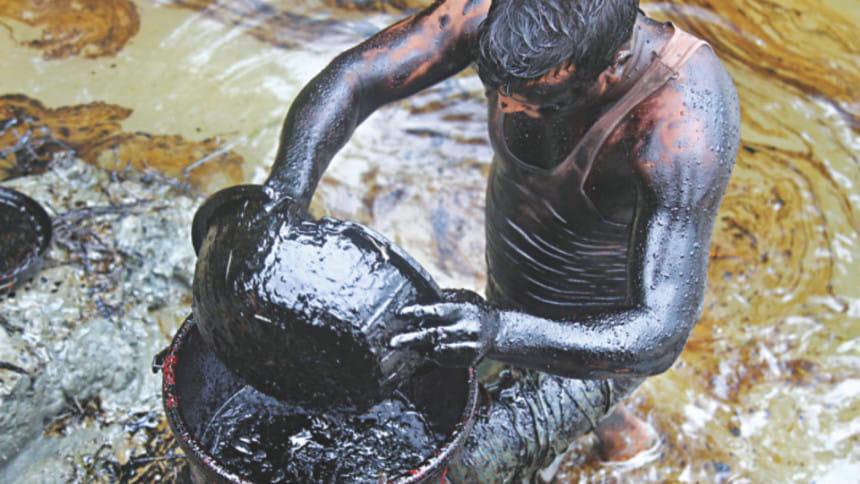Disaster tackling disastrous

How does Bangladesh handle a disaster like an oil spill? Why use utensils?
This is not a joke but the reality as we have found in two instances of major oil spills -- one in December in the Sundarbans and the other in Boalkhal in Chittagong this month. In both cases, our national strategy was to scoop out the oil using utensils. We do not need any other equipment or expertise. We deploy villagers and ordinary workers to carry out such task.
In the first instance, on December 9, an oil tanker carrying 3.58 lakh litres of furnace oil sank in the world's largest mangrove forest, after being hit by a cargo vessel. Most of the oil spread beyond 70km stretch of the Shela and Pashur rivers.
The forest department deployed a few hundred boats for the clean-up. Workers collected around 70,000 litres of the oil using fishing nets, sponges and utensils.
The remaining ended up getting stuck on plants. The extent of damage to marine life and biodiversity of the Sundarbans in the long term is still unknown.
Following the incident the government brought in a UN experts team for damage assessment.
But it did not prompt the government to form an oil-spill rescue team that would have the expertise and tools to deal with such situations.
It was for the first time such a disastrous incident took place inside the Sundarbans. Therefore the government had some defensive arguments for its failure to handle this situation.
Then we had this accident in Boalkhal on June 19. Three rail wagons, each carrying 25,000 litres of furnace oil for Dohazari Peaking Power Plant, plunged into the canal when a bridge collapsed at Khitabchar of Boalkhal.
As the canal is connected to the Karnaphuli river, the spill spread around the area, killing fish and affecting the soil of the adjacent farms.
Like the Sundarbans situation was mainly left to the Forest Department, the Boalkhal situation has been left to the rail authorities. The rail authorities are concerned about recovering their wagons, an attempt which spread the oil further as huge amount of oil began gushing out of the one of the containers when they were being pulled out.
All the while, locals were seen collecting the oil using utensils.
Protecting the water bodies was not certainly in the mind of the government then. It seems that the government is totally unconcerned about the long term environmental impact of an oil spill in the water. It's as if the destruction of fisheries and their habitats or negative impacts on adjacent vegetable fields are "natural consequences" of the accident. The three rail wagons got more attention because the government can quantify their monetary loss while it cannot quantify the far greater environmental loss because it takes expertise to understand it.
The government also does not bother to see what health risk the villagers are becoming exposed to when they are venturing out in those murky waters with utensils to collect the oil. If a man is exposed to oil like the ones photographed in newspapers, he risks delayed effects on his vital organs as he is inhaling the toxic fume while getting himself soaked in the oil for a long time. Who cares about a villager? Well, that man may be spending more money for his healthcare in the long term. If that's not the government's concern, then what is the job of a government?
There was no presence of the environment department and we see no initiative from the government to form a team that has the expertise to handle such a disaster.
Usage of oil or other fuels will continue to rise due to the nation's economic development. Therefore, once in a while, there may be an accident that would not just affect the environment, but the livelihood of people and damage food sources. A government cannot be so insensitive as it is acting now. It is its duty to minimise the damage smartly and therefore it should immediately form a rescue team with proper expertise and tools. Utensils are in no way the tools for such rescue operation.

 For all latest news, follow The Daily Star's Google News channel.
For all latest news, follow The Daily Star's Google News channel. 



Comments